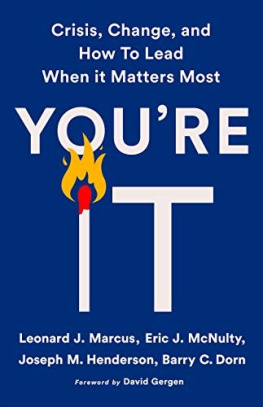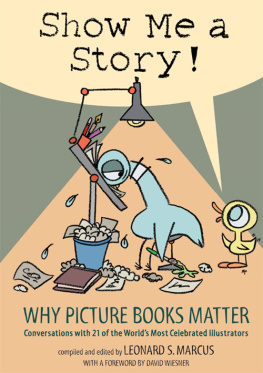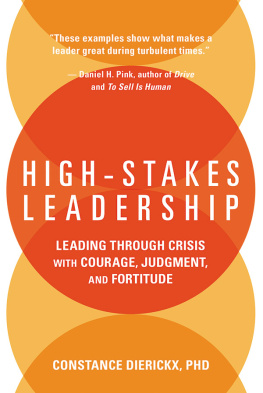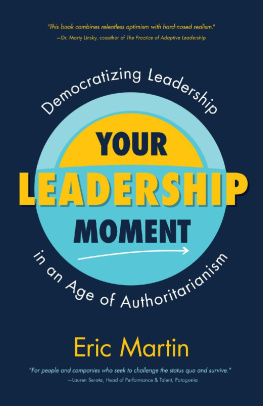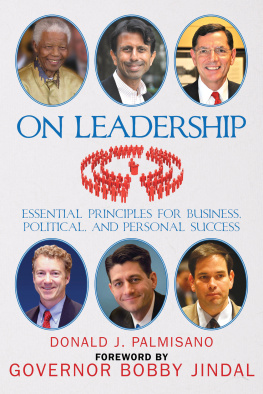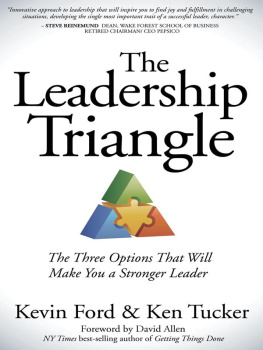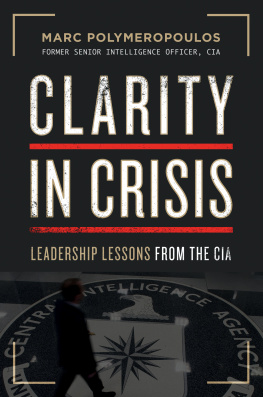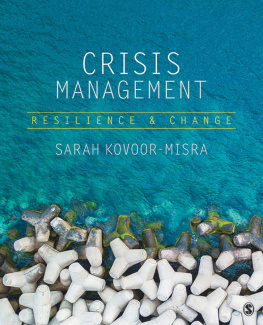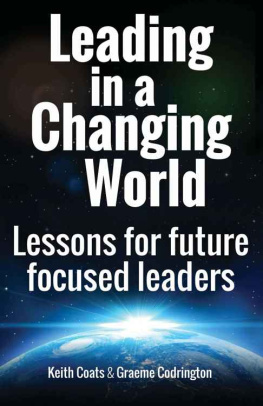Copyright 2019 by Leonard J. Marcus, Eric J. McNulty, Joseph M. Henderson, and Barry C. Dorn
Cover design by The Book Designers
Cover copyright 2019 Hachette Book Group, Inc.
Hachette Book Group supports the right to free expression and the value of copyright. The purpose of copyright is to encourage writers and artists to produce the creative works that enrich our culture.
The scanning, uploading, and distribution of this book without permission is a theft of the authors intellectual property. If you would like permission to use material from the book (other than for review purposes), please contact permissions@hbgusa.com. Thank you for your support of the authors rights.
PublicAffairs
Hachette Book Group
1290 Avenue of the Americas, New York, NY 10104
www.publicaffairsbooks.com
@Public_Affairs
First Edition: June 2019
Published by PublicAffairs, an imprint of Perseus Books, LLC, a subsidiary of Hachette Book Group, Inc. The PublicAffairs name and logo is a trademark of the Hachette Book Group.
The Hachette Speakers Bureau provides a wide range of authors for speaking events. To find out more, go to www.hachettespeakersbureau.com or call (866) 376-6591.
The publisher is not responsible for websites (or their content) that are not owned by the publisher.
Library of Congress Cataloging-in-Publication Data
Names: Marcus, Leonard J., author.Title: Youre it : crisis, change, and how to lead when it matters most / Leonard J. Marcus, Eric J. McNulty, Joseph M. Henderson, Barry C. Dorn. Other titles: You are itDescription: New York : PublicAffairs, [2019] | Includes bibliographical references and index.Identifiers: LCCN 2018053723| ISBN 9781541768031 (hard cover : alk. paper) | ISBN 9781541768055 (ebook : alk. paper)Subjects: LCSH: Crisis management. | Leadership.Classification: LCC HD49 .M366 2019 | DDC 658.4/056dc23LC record available at https://lccn.loc.gov/2018053723
ISBNs: 978-1-5417-6803-1 (hardcover); 978-1-5417-6805-5 (ebook)
E3-20190508-JV-NF-ORI
CONTENTS
To you, our readers: Youre it!
Explore book giveaways, sneak peeks, deals, and more.
Tap here to learn more.
Nearly every Baby Boomer can remember exactly where they were and what they were doing when they heard that President John F. Kennedy had been shot, just as nearly every Millennial can remember when word reached them that airplanes had crashed into the World Trade Center, the Pentagon, and a field in Pennsylvania. There were many similarities between the events: the sense of horror that gripped at Americans throats, the fear that we might be under a sustained attack, the worry about loved ones. Each of these tragedies helped define a generation.
But there was one significant difference between the two: America was much better prepared for the 9/11 disaster than for the Kennedy assassination. The presidential assassination was a bolt from the blue, something we had not experienced since 1901, something we had never witnessed before on live television. And as we saw when Lee Harvey Oswald was shot, the locals were simply not ready.
By contrast, an earlier attempt to blow up the Trade Center prompted officials in New York City to make themselves ready. Officials many times practiced what they would do if terrorists struck again; the fire and police forces knew what to do and were prepared to sacrifice their lives in order to spare others; even as the Secret Service moved President Bush into temporary seclusion, New York Mayor Rudy Giuliani stepped forward and, in his finest hour, calmed the nation. Readiness matters.
Even if officials were prepared to act, events surrounding 9/11 also had a ripple effect across the country. Soon after the attacks, as described in this book, the Centers for Disease Controls first Director of the Office of Terrorism Preparedness and Emergency Response met with Lenny Marcus and me to see what could be done to strengthen national response leadership. Shortly thereafter, government leaders along with faculty from across the university gathered at Harvard to inaugurate the National Preparedness Leadership Initiativeor NPLIin the early 2000s. They together foresaw that the country and world might be entering an era of turbulence when terrorists might hit Anywhere, USA, and they wanted to partner to develop an executive education platform that would study and train first responder leaders from local, state, and federal offices in emergency preparedness. They recognized that to make the country safer, leadership matters. And as this book shows, they also recognized that these same lessons apply to business leaders of all kinds as they face their own criseswhether its a product recall or a media controversy.
The NPLI was on a roller coaster in its early years. It turned out that starting an education program across government agencies and across jurisdictions was harder than it looked, and getting different parts of a university to collaborate could be even more challenging. Money had to be found in different corners of government to pay for training. No one knew whether it would survive periodic budget cuts.
But over time, as results piled up, NPLI gained traction and now has reached its fifteenth year. It has a proud record of training thousands of senior leadersfrom government, humanitarian organizations, and businesses large and small, and from across the country and around the worldto meet a wide variety of emergencies. That training includes bringing leaders to the Harvard campus twice over a six-month period, the first time for intensive training by faculty from across the university and the second as a follow-up to see how lessons from the classroom have played out in the field. Importantly through this work, officials from different departments and different levels of responsibility have formed a close network of colleagues and friends who are there for each other. In the midst of any big emergency, there are frequently several NPLI alumni working across boundaries with each other, pulling on the leadership knowledge, skills, and practices theyve gained during their time at Harvard.
One of the strengths of the program has been its adaptability. When it comes to disaster relief, the NPLI initially focused on responses to terror, but as weather-related disasters have grown ferociously in recent years, classes now turn more frequently to the effects of climate change. And in their private-sector training, theyve added a focus on cyber security, and are helping corporations identify the moments of crisis more quickly as the speed of technology demands. No doubt, they will continue to evolve in the future.
Of course, no one would argue that NPLI is a panacea. Preparedness is an all-hands-on-deck requirement in addressing emergencies. In the battle against Hurricane Katrina, for example, Admiral Thad Allen and his Coast Guard contingentwho assumed leadership late in the responsewere valiant in saving lives and inspiring confidence. By contrast, the local leadership in New Orleans was widely seen as ineffectual and over its head. Clearly, every jurisdiction in the country now has an interest in training up its top people and its responders to meet once-in-a-hundred-years storms or the ravages of uncontrolled fires.
What the NPLI can do that is very hard in government is to play to its strengths: discovering and amassing knowledge, sorting out best practices, teaching othersthe lifeblood of universities. There are definitely lessons to be learned about emergencies, both from the American experience and from the experience of others.
I well remember when the chief of London police visited an NPLI program several years ago. In Britain, the policenot a national teamare responsible for dealing with terrorist incidents. The London chief outlined how the officer in charge of first responses would have at his side someone with equivalent experience to his own to be a second pair of eyes and ears for the chief. The officer in charge, said our London visitor, might be so focused on one aspect of the response that he or she would miss the big picture. The companion is there to be a quiet voice in the ear of the leader. Listening, I was reminded of a short film that is popular in universities: it shows a half-dozen students with a basketball and asks students to count the number of times the ball is thrown quickly back and forth. After the film ends, the teacher asks students how many passes occurred. Guesses vary. Then the teacher asks the students if they saw anything else in the film. At least a quarter of viewers (I remember; I was one of them) say no. What they miss is that while the ball was flying back and forth, an upright gorilla walks through their midst. Aha, I thought, thats why the Brits have a second observer for emergencies. Notice what might be obscured by the circumstances. Point well taken.
Next page
